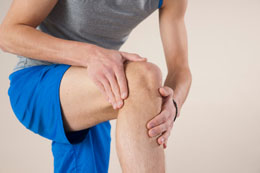Any damage sustained by the ligaments that support the knee joint can lead to a serious case of knee instability. Though modern medicine has found ways to fix this problem, it still cannot be avoided completely. The following article provides information about the various causes and treatment options available for this condition.

The knee is made up of a number of entwined ligaments and tendons, and a rupture or a tear in any of these ligaments or tendons may lead to a serious case of instability. This is a medical condition that needs immediate attention, as the pain can hamper the movement of an individual.
Medical science has advanced enough for the doctors to be able to accurately ascertain the exact cause behind a knee pain. Also, the rehabilitation of such problems can be carried out simply and quickly. This of course depends on the severity of the condition.
Causes
Before we delve into the exact causes of a knee injury, let's understand the various ligaments that support the knee joint. There are 4 ligaments that support the knee joint in addition to the menisci and the condyles, and they are the anterior cruciate ligament (ACL), the posterior cruciate ligament (PCL), the medial collateral ligament (MCL), and the lateral collateral ligament (LCL). The posteromedial and posterolateral capsular components and the iliotibial tract also make significant contributions in the knee joint.
The primary reason behind this condition can always be traced back to some sort of trauma or condition such as iliotibial band syndrome. This can occur as a result of a direct force impacting the knee, or the knee slowly damaging over time due to a simple act like walking. Athletes and sportsmen are more likely to face this problem as they have to routinely undergo some rigorous training regimes, which ultimately take a toll on the knee joints. A sudden movement sometimes results in a very painful twist in the knee that leads to ligament damage such as medial collateral ligament sprain, and this occurs most commonly due to sudden jumping or deceleration.
There are a variety of reasons that may lead to this situation, the most obvious being some strenuous physical activity. Other events like turning too fast or twisting can also lead to such a scenario, and it is impossible to predict what action can lead to such an occurrence. In extreme cases, an arthroscopic knee surgery or a knee replacement surgery is the only option available.
Available Treatment
The extent of the damage can only be assessed by a qualified and experienced medical expert, and once this has been assessed, the suitable mode of treatment can be suggested. There are several grades into which an injury can be placed, and the higher the grade, the longer the knee will take to heal. The assessment begins with various knee tests to determine the extent of damage. If there is a distinct 'popping' noise heard then the damage is pretty high, and any other observations by the patient can also come in handy.
The patient's lifestyle and routine is also assessed thoroughly in order to determine the exact cause of this condition, and which corrective and rehabilitative measures can be taken to treat it. The age and the medical history is also studied in detail to obtain some more clues, and a plain radiography of the knee is also vital.
Once the causes and the extent of damage have been determined, a suitable course of action is set. As soon as the diagnosis is complete the rehabilitative process begins and this may take a few weeks to several months. The process aims at restoring the complete range of motion of the patient without putting any stress on the graft. A number of exercises are demonstrated to the patient and some other exercises and movements that need to be avoided are also explained.
In some cases the restructuring of the ligament is also necessary, and on an average it is fair to assume that the total time period for recovery is anything between 5-7 months.
Disclaimer:
This Buzzle article is for informative purposes only, and should not be used as a replacement for expert medical advice.


 The knee is made up of a number of entwined ligaments and tendons, and a rupture or a tear in any of these ligaments or tendons may lead to a serious case of instability. This is a medical condition that needs immediate attention, as the pain can hamper the movement of an individual.
The knee is made up of a number of entwined ligaments and tendons, and a rupture or a tear in any of these ligaments or tendons may lead to a serious case of instability. This is a medical condition that needs immediate attention, as the pain can hamper the movement of an individual.